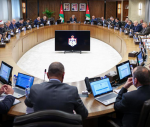You are here
Poll shows citizens’ views of human rights, Cabinet reshuffle
By JT - Nov 19,2019 - Last updated at Nov 19,2019
AMMAN — A poll conducted by the Centre for Strategic Studies at the University of Jordan on Sunday showed that less than a third of the Jordanian population are aware of the National Centre for Human Rights (NCHR), and only 3 per cent knew about the most recent report the centre issued.
The poll, which was conducted by the Department of Public Opinion Polls and Surveys from November 11 to 14 and surveyed a representative sample of Jordanian society from all governorates, was included in the “Jordanian Street Pulse” poll series, according to the Jordan News Agency, Petra.
The poll addressed urgent issues currently facing Jordan, the region and the international community. “Jordanian Street Pulse" focussed on the fourth Cabinet reshuffle by Prime Minister Omar Razzaz on November 7, as well as the annual report issued by the NCHR.
The poll showed that half of the population were aware of the most recent Cabinet reshuffle, and that 30 per cent of those surveyed believe that the recent shakeup will enhance the performance of the government, while 27 per cent believe it will not. Of those who were aware of the reshuffle, 37 per cent believe that the reshuffle will not affect the government’s performance.
Forty-one per cent of them indicated that a new Cabinet was warranted, while 52 per cent thought it was not necessary.
According to the poll, 30 per cent of those surveyed indicated that they were aware of the NCHR, while 70 per cent did not know of its existence. Of those who knew of the centre, 33.4 per cent said that although they had heard of the centre, they did not know anything about it.
While 23 per cent said that the role of the NCHR is to protect human rights, around 14 per cent said that the centre's role is to address the problems of citizens and society. Twelve per cent indicated that the purpose of the centre is to defend human rights in Jordan.
Concerning the 15th annual report issued by the NCHR in November on the status of human rights in Jordan in 2018, poll results showed that 3 per cent were aware of it, while 97 per cent were not.
Of those who know of the report, less than half noted that the government followed the report's recommendations, while 42 per cent said it did not.
Around 69 per cent of those who are aware of the report think that the government should follow its recommendations, while 16 per cent hold the view that it should not.
Unemployment is the most pressing local issue, according to the poll. Following unemployment, poverty came in second at 18.1 per cent, and difficult economic conditions came in third among local issues. Price hikes and high living costs registered 9.5 per cent, followed by corruption and favouritism at 7.4 per cent, Petra reported.
Regionally, crises and wars are thought to be the most urgent issues at 21.1 per cent, followed by Jerusalem, the Palestinian cause and the “Deal of the Century” at 16 per cent. Difficult economic conditions in the region were third at 13.4 per cent, followed by safety, security and stability at 11.8 per cent.
Internationally, Jerusalem, the Palestinian cause and the "Deal of the Century" are considered the most pressing issues at 16.9 per cent. Wars and conflicts followed at 16.4 per cent, and difficult economic conditions at 10.6 per cent. Around 36.8 per cent said that they are unaware of the most urgent issues facing the international community.
Related Articles
AMMAN — Only 30 per cent of the public and 35 per cent of opinion leaders believe that the situation in Jordan is going in the right directi
AMMAN — A recent opinion poll has revealed that 86 per cent of Jordanians believe that domestic violence is prevalent in the country, while
AMMAN — A local study has revealed that 71 per cent of Jordanians go online on a daily basis, while access to social media platforms is part

















